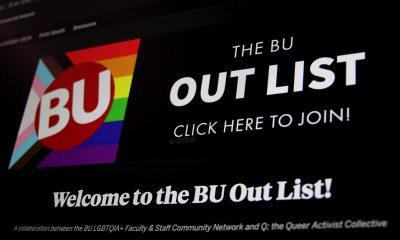Boston University’s Queer Activist Collective, or Q and the BU LGBTQIA+ Faculty & Staff Community Network worked together to release The BU Out List — a resource for students to find faculty and staff who identify as LGTBQ+ at Boston University, as well a source of connection for students and staff.

Christian Paredes, a rising senior in the College of Arts and Sciences, is on the executive board of Q who worked as a student co-chair with the LGBTQIA+ FSCN to create the Out List.
The BU Out List invites LGBTQ+ faculty and staff members across campus to create a profile only accessible to the BU community. Students cannot make profiles for themselves, but can search through staff profiles.
Each faculty and staff profile can include someone’s sexual orientation, gender identity, race, romantic orientation, religion, hometown and whether they were a first-generation college student. Including the additional information in profiles helps LGBTQ+ students “find those intersections” in their community, Paredes said.
Paredes said meeting his queer mentors at BU, including professors now visible on the Out List, was “serendipitous.”
“I came across one professor who is queer my sophomore year and ended up forming a really great relationship because she can see me in a different way as a person,” he said, “and it really changed the trajectory of my career.”
He said the Out List, which is accessible to the entire BU community, can help facilitate those types of connections for other students.
“It’s more easy for people to see which departments or which subjects might have a professor that they’ll feel more comfortable in a classroom,” Paredes said. “That could be really meaningful for having a great experience at BU and just feeling like they’re in a more inclusive environment.”
Thomas Lee, the academic program administrator for the School of Public Health and the vice chair of the LGBTQIA+ FSCN, said the Out List was inspired by the Boston University Medical Campus OUT & Ally List, which includes the option to be identified as an ally as well.
Lee and Paredes, who worked together to compile the Out List, said their choice to not include allies was to maintain a platform for specifically queer voices.
Lee said the Out List helps fill the gap between faculty and staff and students in the LGBTQ+ community. During his graduate studies at BU, he said he had limited ways of connecting with queer faculty members. Now, as the vice chair of the taskforce, he said he’s working to create a more visible queer community at BU.
“Our main goals are to promote a deeper sense of community and celebrate identity among LGBTQIA+ faculty and staff at BU,” he said. “There was a huge vacuum at BU, like this didn’t exist. One of the main findings of the taskforce a few years ago was there aren’t systems in place for queer faculty and staff and to some extent students to really build community.”
Christopher McKenzie, an instructor in film and television at the College of Communication, said he has “the privilege to be able to say that I’m bisexual.” He said he chose to be visible on the Out List because he wants to be a resource for LGBTQ+ and questioning students.
“Even though we live in a part of the country and part of a world that is relatively tolerant and progressive, it is still an important thing to step forward and speak out and assert who we are,” McKenzie said. “I feel a responsibility as an academic, as an instructor, not to necessarily to proclaim it from the high rooftops, but to say, ‘this is who I am, this is part of what makes up me.’”
McKenzie said the Out List can help provide a “beacon of normality” for LGBTQ+ students to see queer faculty and staff in different careers and fields. He said especially in fields such as STEM or business, a faculty member who “steps forward and speaks their truth about their identity” has a lasting impact on students.
Lee said the Out List also “has given [Q] a virtual space” by using the Out List as a their unofficial homepage, promoting resources for queer students and strengthening Q and the LGBTQIA+ FSCN’s relationship.
“It’s really been a way to unify and almost build a coalition,” Lee said. “There were so many independent groups before, and now there is a centralized platform which is way more effective when you have the voices unified.”


























































































































